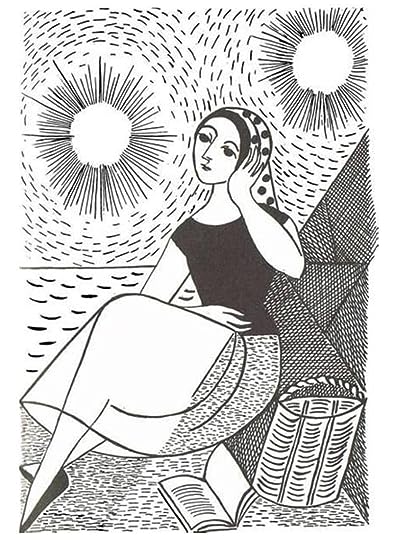What do you think?
Rate this book


103 pages, Paperback
First published January 1, 1940




When I was finally able to sleep, it was very late. The music and the shouting woke me up a few hours later. I have not slept soundly since my escape; I am sure that if a ship, a plane, or any other form of transportation had arrived, I would have heard it. And yet suddenly, unaccountably, on this oppressive summerlike night, the grassy hillside has become crowded with people who dance, stroll up and down, and swim in the pool, as if this were a summer resort…
She watches the sunset every afternoon; from my hiding place I watch her. Yesterday, and again today, I discovered that my nights and days wait for this hour. The woman, with a gypsy’s sensuality and a large, bright-colored scarf on her head, is a ridiculous figure.
The two suns and the two moons: Since the week is repeated all through the year, some suns and moons do not coincide (and people complain of the cold when the weather on the island is warm, and swim in fetid water and dance in a thicket or during a storm). And if the whole island were submerged – except for the machines and projectors – the images, the museum, and the island itself would still be visible.




Then I resumed my efforts, moving to other parts of the wall. Chips fell, and, when large pieces of the wall began to come down, I kept on pounding, bleary-eyed, with an urgency that was far greater than the size of the iron bar, until the resistance of the wall (which seemed unaffected by the force of my repeated pounding) pushed me to the floor, frantic and exhausted. First I saw, then I touched, the pieces of masonry— they were smooth on one side, harsh, earthy on the other: then, in a vision so lucid it seemed ephemeral and supernatural, my eyes saw the blue continuity of the tile, the undamaged and whole wall, the closed room.‘Reasoned Imagination’ – That is how Borges describes this mindboggling attempt of Adolfo Bioy Casares, in what, that my humble mind can ascertain, is a superlative member of post-modernist, abstract fiction canon. Why does the mind battle its familiar boundaries in the thirst of alien waters? What rewards lie at the other end that compel acceptance of a torturous sentence, bordering on pragmatism and surrealism, pushing the soil beneath the feet to an unknown abyss? What does one achieve by undertaking a journey that robs him off his sanity and instead, plants a foreign temperament that forges alliance with none, not even with its owner? Oh no one really knows all the answers but the temptation to venture into such a world is one that has not spared a single, active mind.


“Perhaps we always want the person we love to have the existence of a ghost.”




